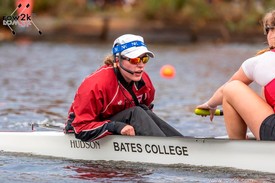
Moscow! The adventure continues.
The 1979 World Rowing Junior Championships with Margi and Betsy competing in the women's pairs would be the test event for the 1980 Olympic Games. The Krylatskoye rowing facility includes an innovative separate channel to reach the start without having to row up the actual race course, and there is a friendly janitor around all the time. He reeks of vodka, and all he wants to do is trade for pins. People refer to him as the Mayor of Krylatskoye.
So how did the rowing go? Remember how physically and emotionally exhausted we had been after seven months of federation machinations and after all that travel, including our two 24-hour bus rides? Well, we never recover.
Back at the U.S. Nationals in Detroit in June, we had beaten by open water the Canadian pair that ended up rowing 5 and 6 in the soon-to-be World Champion Canadian Junior Women's Eight in Moscow.
World Champion! I kid you not.

Later at the Canadian National Team time trials on the Welland Canal, we were lengths faster than the two girls selected to compete in the Canadian pair in Moscow, but when we got to Krylatskoye they beat us by nearly five seconds.
Bottom line: early in the summer, before the USRA had sunk their teeth so deep into our flesh, we had demonstrated the speed to make the A Final at the World Rowing Junior Championships in Moscow, maybe even contend for a medal . . . but not when it counted, I'm afraid.
If only . . .
Incidentally, there was never, ever even a hint of disagreement between any of us and Anita De Frantz. She and I remain very good friends. I see her often, far more often than I see Margi or Betsy. She was recently at our La Jolla home for dinner, and I got to introduce her at the 2018 San Diego Crew Classic. She was on a book tour for her new book.
In all these years we have never mentioned 1979. I hope we never do.
And it was Anita who got my wonderful wife Susan and me fabulous seats at the Olympic Rowing at Eton-Dorney in 2012.

There we were, surrounded by a host of my Olympic heroes, among them Giuseppe Moioli and Franco Faggi from the peerless 1948 Olympic Champion Italian Coxless-Four from Canottieri Moto Guzzi, along with Dudley Storey, 1968 New Zealand Olympic Champion, and Dick Tonks, his 1972 Olympic Silver Medal teammate, later 5-time World Rowing Coach of the Year, true friends and inspirations to all and to me.

Trust me. We have ONLY the very best of feelings toward our very, very dear friend, Anita DeFrantz.
Let's take a break from reminiscing and move on briefly to a couple of linguistic pet peeves of mine, another example of how I see things as black or white, sometimes to my detriment.
Thanks to my good friend, Joe Flohr, I am well aware that saying "crew team" is like saying "volleyball ball" . . . or Rio Grande River . . . or ATM machine . . . or Department of Redundancy Department. A crew already is a team, for Heaven's sake! Do the world a favor. Never say "crew team" ever again!
And I also know that a "scull" is always an oar and never, ever, Ever, EVER a boat, so you can never, ever, Ever, EVER go out and "row in a single scull". Sorry, "Max Schmitt in a Single Scull".

By the way, the artist Thomas Eakins didn't make that mistake. He named the painting "The Champion Single Sculls". Years later someone else got the bright idea of changing the name. Eakins had passed away and couldn't object.
If you are among the many language lawbreakers here, to be sure you shouldn't be too hard on yourself. The English language does the sport of rowing no favors. For two centuries, too many otherwise well-intentioned English-speaking people around the world have jumped to the quite logical-sounding conclusion that a "single sculler" in a "single sculls" race would certainly row in a "single scull". It's obvious. It makes perfect sense.
NO, NO, NO, NO, NO! Absolutely NOT!! And that's final!!!
Let me take a breath here . . . No, it doesn't. In reality, and literally, it makes no sense at all.
When she was very young, my niece asked the following question in response to her family automobile that would periodically speak:
"How can a door be a jar, Daddy?"
- Liz Mallory Kenmore
Simple answer here. It can't.
I ask the same:
"How can an oar be a boat?"
- Peter Mallory
One word cannot describe at the same time both an oar and a boat, two related but mutually exclusive pieces of equipment. It's one or the other, and in the English-speaking world from the Middle Ages and before, scull has meant a type of oar! Period. A sculler takes two sculls from the scull rack, puts them in the port and starboard oar-locks (or scull-locks), and rows a boat of some sort in a single sculls or double sculls or quadruple sculls event. Every time! No exceptions! (Note that in the English language, events, sweep or sculling, are always plural, as in the Diamond Sculls at Henley.)
Sorry, World Rowing announcers and video commentators. Sorry, worldrowing.com.
No venerable Thames professional waterman would ever have made such a linguistic faux pas. It was only when uninformed British "gentleman" amateurs invaded the world of true professionals 200 years ago that rowing terms began to be misunderstood and misused.
Other languages do not have this problem. The French call a racing boat built for a single sculler a skiff and an oar a rame, the Italians skiff and remo, the Germans einer and ruder.
In Britain in the 17th and 18th Centuries, the boats that were used in formal and informal competitions were working boats of specific types with specific names like cutters, gigs, shallops, wherries and lighters. No problems yet. By the 1830s, boats began to be purpose-built for competition. They were referred to as "wager boats", sometimes as funnies or even skiffs, following mainland European precedent . . . and sculls were still understood as oars well into the 20th Century.
Now don't be a smart a** and go and look up "scull" in a dictionary of the English language! I know! People have been getting this wrong for so darn long - for two centuries now, for Heaven's sake! - that many dictionaries get it wrong now, too! So does that make it okay? At the risk of repeating myself . . .
NO, NO, NO, NO, NO! Absolutely NOT!! And that's final!!!"
Another deep breath . . . No, it doesn't. The word doesn't make any sense otherwise. Usage does not supplant good sense!
Here's a quote worth reading twice:
"Modern English, especially written English, is full of bad habits which spread by imitation and which can be avoided if one is willing to take the necessary trouble. If one gets rid of these habits one can think more clearly . . . [T]he fight against bad English is not frivolous."
So said the immortal George Orwell. George Orwell, for Heaven's sake. As in "War is Peace. Freedom is Slavery. Ignorance is Strength." Have you all forgotten 1984? Really?
A scull is an oar with a shaft and a blade and a collar and a handle. Period. Make the world a little bit better place by following Orwell's advice and taking the necessary trouble, for Heaven's sake. Use the word "scull" correctly, and insist that others do the same. It's not that hard.
Yes, I fully understand that I am Don Quixote fighting what seems to inevitably be a losing battle here, but I am by no means alone in this. Preeminent rowing historian Bill Miller will back me up. Not long ago he even took World Rowing to task on the internet.
I am reminded of a story Stan Pocock told me years ago. When a fellow wrote him to order a single scull, Stan wrote back asking whether he wanted a port or a starboard. With a broad smile and a twinkle in his eye, Stan recalled that he never heard from that fellow again.
To be continued . . .
If you enjoy and rely on row2k, we need your help to be able to keep doing all this. Though row2k sometimes looks like a big, outside-funded operation, it mainly runs on enthusiasm and grit. Help us keep it coming, thank you! Learn more.
Comments | Log in to comment |
There are no Comments yet
| |
- Bont Rowing
- Calm Waters Rowing
- Concept 2
- Craftsbury Sculling
- The Crew Classic
- CrewLAB
- Croker
- Dad Vail Regatta
- Durham Boat Co.
- Empacher
- Faster Masters
- Filippi
- Fluidesign
- h2row.net
- HUDSON
- Live2Row Studios
- Nielsen-Kellerman
- Oak Ridge RA
- Peinert Boat Works
- Pocock Racing Shells
- Race1 USA
- RowKraft
- Rubini Jewelers
- Vespoli USA
- WinTech Racing
- Bont Rowing
- Calm Waters Rowing
- Concept 2
- Craftsbury Sculling
- The Crew Classic
- CrewLAB
- Croker
- Dad Vail Regatta
- Durham Boat Co.
- Empacher
- Faster Masters
- Filippi
- Fluidesign
- h2row.net
- HUDSON
- Live2Row Studios
- Nielsen-Kellerman
- Oak Ridge RA
- Peinert Boat Works
- Pocock Racing Shells
- Race1 USA
- RowKraft
- Rubini Jewelers
- Vespoli USA
- WinTech Racing

















